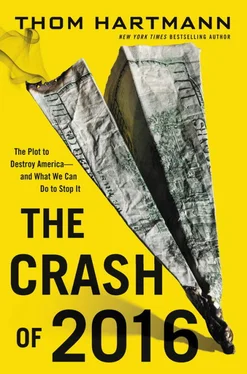The ultimate “power to the people” is for homes to have their own solar roofs, no longer needing power lines from distant power plants owned by big transnational corporations.
A few countries are pushing this solar tipping point, like China and Germany. Jimmy Carter started us in this direction a generation ago, but Reagan and the Bushes paused it, and we’ve never recovered. Ironically, if our government doesn’t participate in bringing along the tipping point to solar and other renewable-energy systems, it’ll happen anyway because of the strong demand in other nations that is driving the technology to be cheaper and more easily accessed. The only downside for us will be that, like with our clothes and computers and TVs and pretty much everything else except weaponry, we’ll be buying our solar panels from overseas.
The final point, which I also noted in my book Rebooting the American Dream , is that if we don’t strip oil of its strategic value, we will continue to be at the mercy of OPEC—which comprises more than a few nations that don’t much like us.
Stripping Oil of Its Strategic Value
Two hundred years ago, and for a thousand years before that, one of the most strategic substances on earth was salt. It was “strategic” because no army could travel without it—salt was necessary to preserve food in a prerefrigeration era. Wars were fought over it, and countries that had lots of salt made out well, while landlocked countries with no salt reserves were forced to sell their natural resources in exchange for it.
Oil is the new salt. It is now the planet’s number one strategic resource. And as has been noted by numerous commentators since the first Gulf War, in 1990–91, if the primary export of Iraq was broccoli, we wouldn’t have given a damn that Saddam Hussein was a tin-pot tyrant.
The unfortunate reality is that we have within and around our national boundaries about 3 percent of the world’s oil, but we consume about 24 percent of the world’s produced oil. So we buy what we don’t produce. This dependence represents a massive transfer of wealth from us to oil-producing countries. It’s a strategic blunder that would have horrified Julius Caesar, who expanded the Roman Empire all the way to central Europe when he ran out of fuel—wood—by deforesting virtually all of Italy, [4]and then paid the price as his empire began to collapse from overexpansion.
Countries like Saudi Arabia rake in billions from oil-dependent countries like the United States, and oil revenues fuel their economies. In 2008, for instance, Saudi oil revenues spiked to $281 billion, a quadrupling of revenues from 2002. In 2009, those fell sharply to $115 billion, still nothing to sneeze at. 197Oil revenues fund much of the fundamentalist Wahhabi movement within Saudi Arabia, and it’s out of this movement that come the most virulent anti-American and anti-Semitic rhetoric, textbooks, and television and radio programming.
Thirty years ago, the OPEC nations were producing around 30 million barrels a day, nearly half of the world oil consumption. Regardless of how much we buy from them or instead buy from Mexico, because oil is a fungible commodity, their production will continue and just go to others who are no longer buying from whomever we choose to buy from. The proof of this is that today OPEC production is still around 30 million barrels—even though world oil consumption has gone up and is now around 85 million barrels a day. The OPEC nations don’t adjust production to meet demand; they maintain it to control prices so they have relatively stable income.
Thus, the only way we can change this situation is to reduce the amount of oil we use. Oil is a strategic commodity, and we need to strip it of its strategic value.
So what do we use all that oil for that makes it a strategic resource? We certainly don’t use it to produce electricity—only 2 percent of our electricity is generated by oil, because we have huge domestic supplies of coal, which produce over half of our electricity. Pretty much nobody is producing electricity with oil except the oil-rich countries of the Middle East—even rapidly-growing countries like China and India, for example, are not producing oil-fired power plants.
Thus, moving to solar, wind, biomass, or even nuclear power to generate electricity in the United States will help tremendously with our CO 2output and all the pollution “externalities” associated with coal—but it will not make us less oil dependent or strip oil of its strategic significance.
The simple fact is that oil accounts for roughly 95 percent of the energy used for transportation in the United States (our military is the world’s single largest consumer of oil), and that’s what makes it “strategic.” If we want to strip oil of its strategic value so it can’t be used as a weapon against us and so we can use our remaining oil supplies for rational things, such as producing plastics and medicines, we need to shift our transportation sector away from oil, and do so quickly.
This has been the essence of T. Boone Pickens’s rant, although the eccentric oil billionaire is now a natural-gas billionaire, and he’s suggesting that we convert our truck fleet in this country from oil to natural gas, which is nearly as bad a source of greenhouse gases as is oil. He’s right that such a change would make us stronger and safer, both militarily and strategically, but he misses the global-warming part of the equation (which is also increasingly becoming a strategic issue, as global climate deterioration leads to crises both at home and abroad).
Europe, Japan, and China are moving fast to shift their transportation sectors from oil to electricity, mostly through the use of trains. Brazil did it over the past twenty years by mandating that all cars and trucks sold would have to be “flex fuel”—capable of burning gasoline or ethanol, diesel or biodiesel. The result is that Brazil now provides nearly half of their transportation needs with domestically grown ethanol made from sugarcane (over 80 percent of their cars and trucks are now flex-fuel). And the added cost to Brazilian drivers to buy a flex-fuel car instead of gasoline or diesel-only car? About $100.
China is similarly moving in the direction of flex-fuel cars, and doubling every year their methanol production (mostly derived from domestically produced coal).
Flex-fuel cars can also burn part-ethanol, part-gasoline. If, for example, we were to shift to only 20 percent of the fuel being used by a car being gasoline (the remainder being ethanol or methanol), then a single gallon of gas would go five times as far. A 40-mpg car would become a 200-mpg vehicle in terms of the strategic resource of oil-derived gasoline.
Most significantly, in the United States, fully half of all automobiles are driven fewer than twenty miles in any given day. This is an easy range for an electric-only or a plug-in hybrid car, and by moving to the latter immediately—mandating them—we could shift the entire US auto fleet to consuming 50 percent or more electricity instead of gas/diesel in less than a decade, stripping oil of half its strategic importance.
And our trade policies are really stupid on this. We have no import tariff whatsoever on oil, so there is nothing to discourage American drivers from using foreign-produced oil products to fuel their cars and trucks. But we charge an import tariff of over a half a dollar a gallon on ethanol, discouraging Americans from using the fuel and discouraging the more than one hundred countries in the world where there’s enough intense sunlight and where sugarcane grows well from becoming net fuel exporters. And while we offer billions in tax breaks and incentives to oil, gas, and coal companies in the United States, we don’t subsidize or support with tax subsidies (as the Danes are doing) electric or part-electric cars, either in their production or on the consumer end.
Читать дальше












